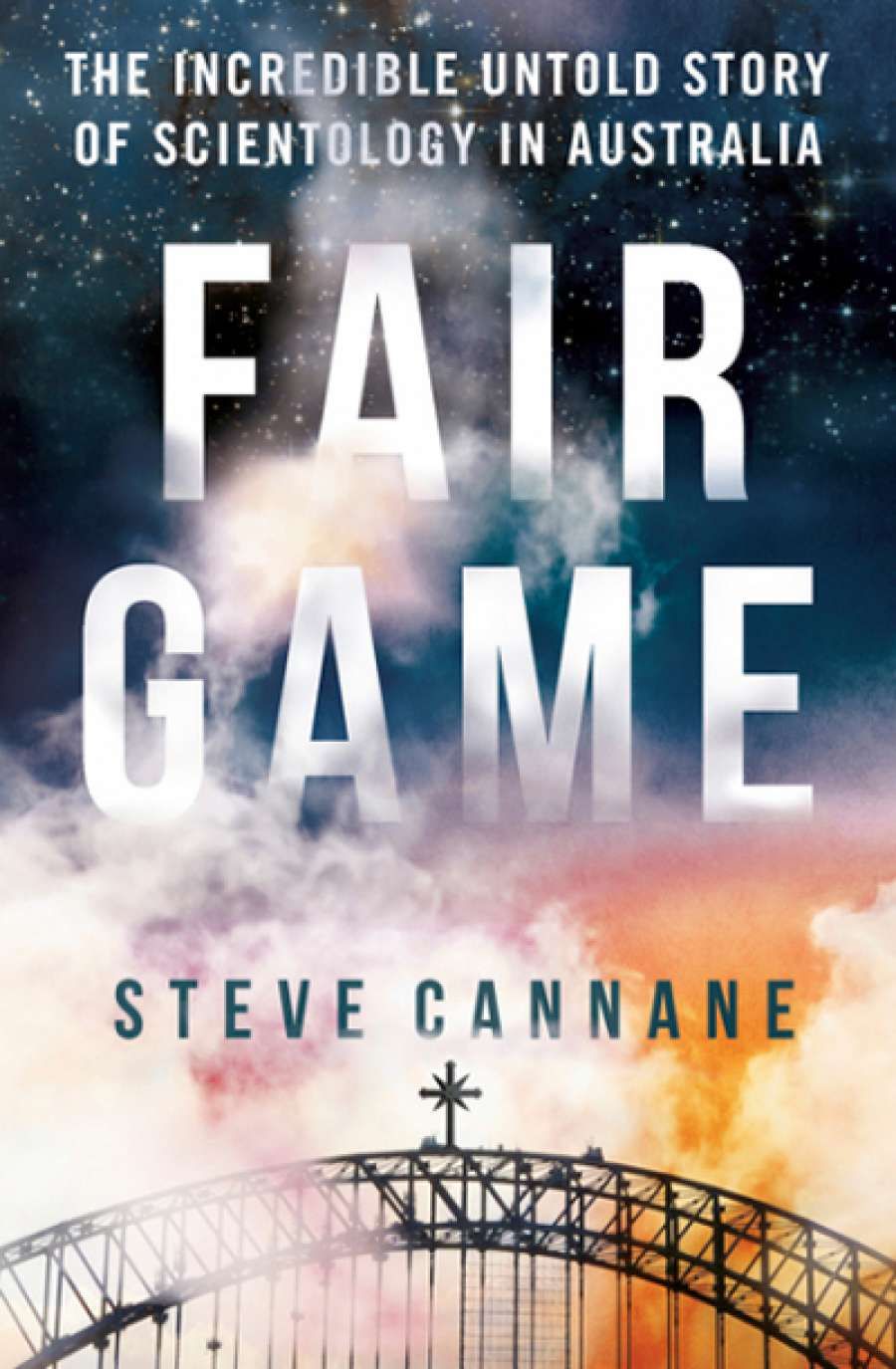
- Free Article: No
- Contents Category: Religion
- Custom Article Title: Fiona Gruber reivews 'Fair Game: The incredible untold story of Scientology in Australia' by Steve Cannane
- Book 1 Title: Fair Game
- Book 1 Subtitle: The incredible untold story of Scientology in Australia
- Book 1 Biblio: ABC Books $32.99 pb, 378 pp, 9780733331329
By 1954 the pulp sci-fi author had written Dianetics, with its highly attractive science of self-improvement, and founded the Church of Scientology. Its philosophy of self-betterment chimed with the times; the book and the movement soon became worldwide phenomena with hundreds of thousands of devotees. They made him millions of dollars and gave him enormous power and influence. Despite Scientology’s claims that it could rid the body of illness, both physical and mental, Hubbard suffered from chronic pancreatitis and died from a stroke in 1986. By this time he was a wanted man, hiding out on a ranch in California and sleeping in his Blue Bird motorhome, ready for a quick getaway if the FBI or his many litigants should track him down. His church, however, under his youthful successor, David Miscavige, was flourishing.
Steve Cannane, author of Fair Game, explains in the Introduction that he is not intent on mocking the belief system of Scientiologists, which includes an evil God Xenu and a race of extra-terrestrials called Thetans. Cannane is much more interested in the abuses of power exercised over the past sixty-odd years, the lives ruined, laws broken. Cannane has spent several years on Scientology’s tail, starting as an investigator for the ABC program Lateline in 2010, which aired accusations of child ill treatment and sexual abuse within the church, charges that were vehemently denied.
The book’s title refers to Hubbard’s instructions on how to deal with critics; opponents who were fair game, he wrote in 1967 could be ‘deprived of property or injured by any means by any Scientologist without any discipline of the Scientologist. May be tricked, sued or lied to or destroyed.’ Targets have included organisations and individuals: journalists, judges, politicians, psychiatrists, and ex-members.
Hubbard’s third wife, Mary Sue Whipp, went to prison for her role in running Operation Snow White, a plan of mass infiltration of government and private offices, including the US Justice, Treasury and Labor departments, and the Internal Revenue Service. The plan, hatched in 1973, was to root out any documents that cast a negative slant on Scientology.
The paranoia and vengefulness extends to members, including those who have held high office. In a climate of fear and constant informing worthy of the Stasi, anyone caught breaking rules, having ‘thought crimes’ or standing up to Hubbard or Miscavige could and can be imprisoned, sometimes for years, in what amount to prison camps, with punishing hard labour. Even those who get out aren’t safe. Former Scientologist spokesman Mike Rinder, who joined the church in Adelaide in the 1960s and rose to become head of its oppressive Office of Special Affairs, left in 2007. Since then he has been under constant surveillance. This, according to Cannane, includes being stalked and being filmed by cameras hidden in neighbours’ nesting boxes.
Cannane is especially interesting on the role of Scientology in Australia, a country Hubbard knew from his wartime posting in Brisbane. Some of the earliest recruits came from Melbourne, and many rose to positions of power. Victoria banned Scientology after the damning Anderson Inquiry of 1963–65. Hubbard, formerly glowing in his assessment of the country, concluded in Scientology’s response, entitled ‘Kangaroo Court’, that ‘only a society founded by criminals, organized by criminals and devoted to making people criminals could come to such a conclusion’.
 Church of Scientology in Melbourne (Church of Scientology International, Los Angeles/Wikimedia Commons)
Church of Scientology in Melbourne (Church of Scientology International, Los Angeles/Wikimedia Commons)
Cannane also explores the role Julian Assange and fellow internet warriors have played in undermining Scientology’s secrecy and practice of hounding critics. At a time of declining membership – in the United States it has fallen from 55,000 in in 2001 to 25,000 in 2008 – the web may be the greatest enemy to the church’s public profile and business model; members pay up to a US$300,000 to reach the highest rung of enlightenment, Operating Thetan VIII, but much of this secret teaching is now freely available on the web, as is a welter of hostile publicity.
Former church spokesman Robert Vaughn Young has described the church’s predicament as Scientology’s ‘Vietnam’. ‘Their only choice is to withdraw’, he is quoted as saying – ‘they cannot win’. For the church, Steve Cannane’s study is another unwelcome sally.


Comments powered by CComment